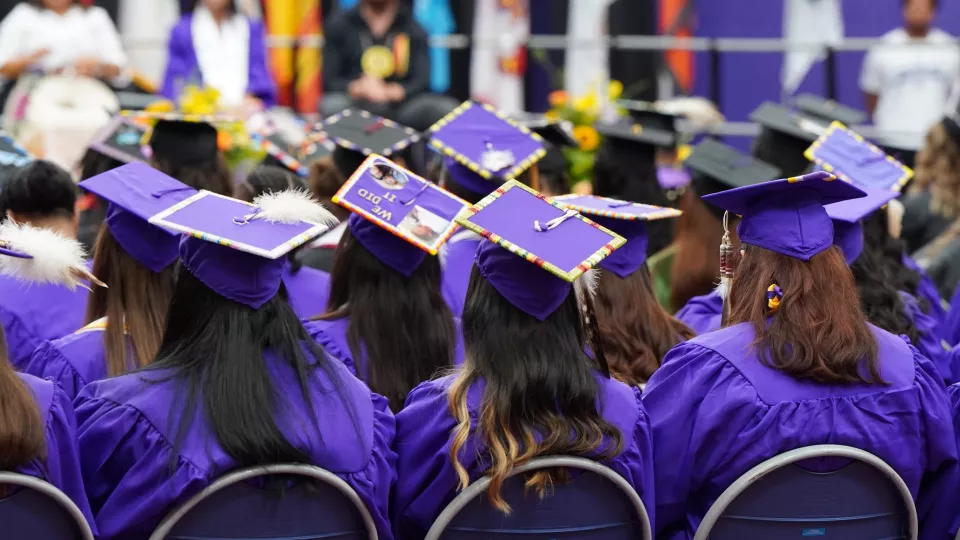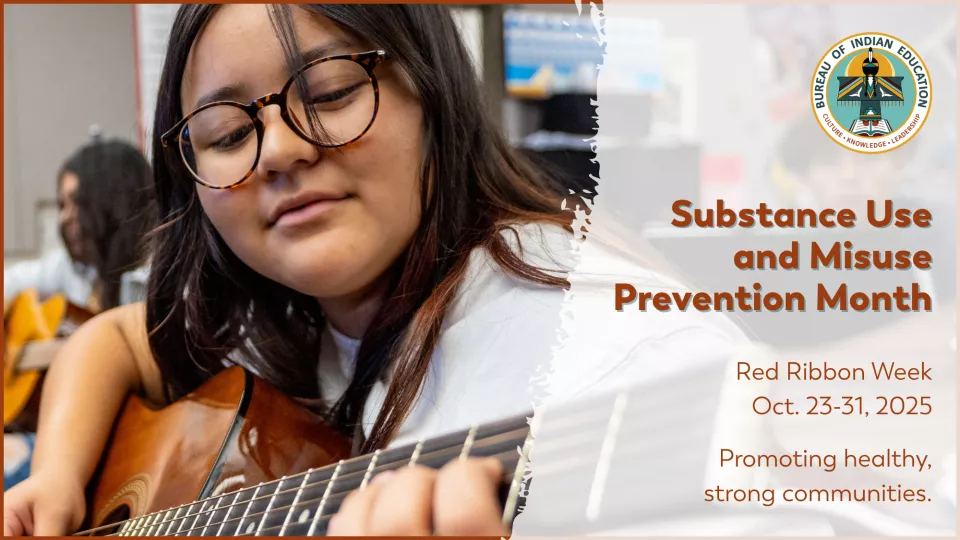
The Bureau of Indian Education seeks to provide students with high-quality, culturally relevant curriculum and opportunities from kindergarten through college. On National Higher Education Day, the BIE highlights its offerings and experiences through Tribal Colleges and Universities. The BIE operates Haskell Indian Nations University in Lawrence, Kansas, and Southwestern Indian Polytechnic Institute in Albuquerque, New Mexico. In addition to operating two postsecondary schools and administering grants for 29 TCUs, BIE funds two Tribal technical colleges and scholarship programs for highly qualified American Indian and Alaska Native students.
Tribal Colleges and Universities
Tribal colleges and universities are primarily located on remote reservations and serve Indigenous communities with limited access to other postsecondary institutions. Twenty-nine colleges and universities operated by Tribal nations received operational grants. Together, they offer everything from associate degrees to doctorates. More than 8,500 students in 13 states attend these institutions that serve Indigenous populations – from near the Article Circle in Alaska to the Mexico border in Arizona.
“Everything at these institutions is grounded in the local value system and their beliefs,” said BIE Office of Postsecondary Education Program Analyst Katherine Campbell, Ph.D.
Twenty-nine TCUs must maintain 51 percent enrollment of students who are members of federally recognized Tribes. Enrollment is increasing. Students can learn Native languages and participate in Tribal cultures while surrounded by other Indigenous students with similar life experiences. They also enjoy the small class sizes and strong relationships with their professors.
“Students build confidence at the Tribal college level where they say, ‘I can be successful here. I can be successful anywhere. It depends on how hard I want to work,’” Campbell said. “I know our Tribal students can do it. I’ve seen them do it.”
Tribal Colleges and Universities continue to expand academic offerings and explore partnerships with other colleges and universities to match the needs of their Tribal communities. Many have also received facilities improvement and renovation funds to upgrade campuses and technology.
“My mantra is our Tribal colleges are a viable option for all Native students – not just students in our BIE-funded schools – because they’re going to get such a unique education there,” Campbell said.
Haskell Indian Nations University
As a centrally located Tribal university, Haskell Indian Nations University welcomed more than 900 students per semester in 2024, all members of federally recognized Tribes from across the country.
“Bringing students together from such a broad scope of Native communities creates a unique atmosphere and opportunities to build networks across various Tribal nations, and that’s one of the primary benefits students have coming to Haskell,” said President Francis Arpan, Ph.D.
Haskell’s academic offerings match the needs of Tribes and Indigenous nations – Indigenous and American Indian studies, environmental science, business and elementary education, among other subjects. The small class sizes allow students to build working relationships with the staff and offer a hands-on learning environment.
They also work together to celebrate their cultures and traditions, including hosting annual powwows.
“It's an atmosphere for our students that stresses the ties to cultural preservation and self-determination and what it means to be from a Tribal community, whether those students grew up in a Tribal community or not,” Arpan said. “I think that is what brings and keeps a lot of students here.”
He advises new students to prepare to take advantage of all of Haskell's on-campus resources: academic support, the Student Success Center, expert faculty, the student affairs office, mental health services, housing and more.
“We are here to help our students succeed from the day they walk on campus to the day they graduate and walk across the stage and beyond,” he said. “We know they’re going to have many questions, and we are here to help them.”
Southwestern Indian Polytechnic Institute
Southwestern Indian Polytechnic Institute stands out among Tribal colleges and universities as a technical school with relationships with surrounding agricultural and high-tech institutes, including Los Alamos, Sandia National Laboratories and Intel Corporation near Albuquerque, New Mexico.
SIPI’s student population represents more than 120 Tribes across the country. It opened in September 1971, with the efforts of the All-Indian Pueblo Council and other Tribes. The student body has grown in its more than 50-year history, representing more than 120 Tribes from the contiguous United States and Alaska.
“SIPI is a place with caring faculty and staff that want to see students thrive and succeed,” said SIPI President Tamarah Pfeiffer, Ph.D. “Students interested in a small community college with lots of student support, including a residential setting, should seek SIPI out.”
Its academic programs offer associate degrees or certifications in many fields, including accounting, business administration, computer-aided drafting and design, early childhood education, culinary arts, geospatial information, optical lab and technology, liberal arts, pre-engineering, environmental science and more.
“The vision care course of study has a 98 percent job placement rate,” Pfeiffer said. “And the adult basic education/GED program is the most sought after by students wanting to enter a four-year program at another institution.”
SIPI also emphasizes preserving and celebrating Native cultures and traditions and integrates cultural awareness and sensitivity into the curriculum and campus activities, meeting the BIE’s mission of providing culturally relevant education. That includes higher schoolers moving to their next phase of life or adult students returning to the classroom.
“Education means advancing the opportunities for expanded life chances for the people we serve,” Arpan said. “The offerings at Haskell and SIPI continue to find ways to meet the mission of why we’re here – and that is our students.”
Learn more about higher education opportunities through the Bureau of Indian Education at BIE.edu.
Contact
Office of Communications
Bureau of Indian Education Central Office
U.S. Department of the Interior
1849 C Street NW, MIB-3610
Washington, DC 20240
Telephone: 202-941-0789
Email: biecommunications@bie.edu





